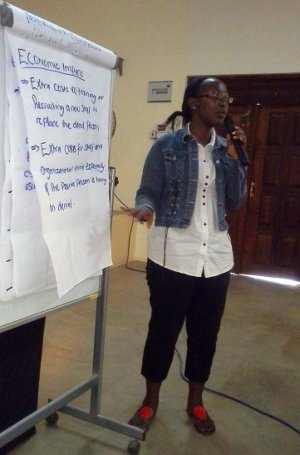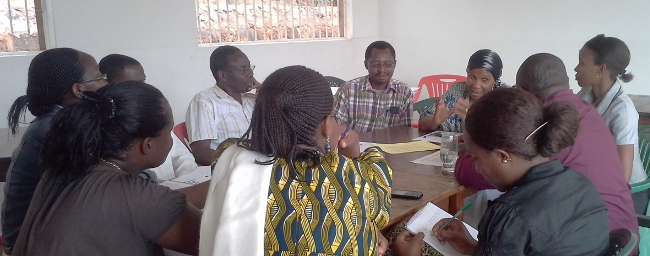Throughout sub-Saharan Africa, millions of adults and children are living with HIV. The disease affects everyone and can have a devastating effect on families, economies, communities, and the environment. Since 2001, the Africa Biodiversity Collaborative Group (ABCG) has been working with partners in Eastern and Southern Africa to learn about the environmental impacts brought on by HIV and AIDS and to identify and catalyze coping strategies for the conservation sector to reduce these impacts.
This year’s World AIDS Day theme is Shared Responsibility: Strengthening Results for an AIDS-Free Generation, which serves as a reminder about the contributions that all sectors can continue to make in overcoming this devastating disease. ABCG’s work on HIV and AIDS aims to raise awareness of the linkages between HIV and AIDS and the environment, and provide guidance to conservation organizations on actions they can take to reduce the impacts on their organizations, their partners and local communities, and the environment.

Effects of HIV and AIDS on the Environment and Conservation Institutions
Impacts on the environment are mainly through loss of conservation capacity and changes in use of land and natural resources. All sectors are affected by AIDS, but the conservation sector is particularly vulnerable because conservation staff are often posted to remote areas without their families, where they may be more susceptible to contracting and/or spreading the disease. Certain natural resource extractors are at higher risk due to the nature of their work, for example fishermen and timber loggers, who may rely on transactional sex to secure resources for income generation. In addition, AIDS affects the way that people use land and natural resources, often leading to damaging and unsustainable practices such as the illegal over-hunting of wildlife for the bushmeat trade.
To address these impacts, the Africa Biodiversity Collaborative Group developed a manual on HIV/AIDS and the Environment: A Manual for Conservation Organizations on Impacts and Responses. The manual provides background information on the origin of HIV, the nature of AIDS and the AIDS epidemic. It outlines the links between the disease and the environment, both on conservation capacity and on use of land and natural resources, showing how gender and poverty have a strong influence through a series of complex linkages. It then describes actions that can be taken to reduce impacts, to help maintain conservation capacity in organizations and local communities; to reduce unsustainable practices as a result of AIDS; and support AIDS-affected communities through alternative livelihoods based on sustainable natural resource use or other low-labor-intensive approaches. Finally, it outlines further needs for learning, collaboration and scaling up. It draws heavily on the work of several conservation organizations and programs working in this field, mainly in sub-Saharan Africa, and illustrates a wide variety of experiences.
Training
Topics included:
- Background on HIV/AIDS and global trends
- Why the conservation community is vulnerable to HIV and AIDS
- Linkages between conservation and HIV and AIDS
- Mainstreaming HIV and AIDS in conservation programs
- Developing an HIV and AIDS workplace policy
At the close of the workshop, each participant was asked to write their individual commitments to take action for mitigating the impacts of HIV and AIDS in their organizations and in their own lives. These commitments include:
- Help in the formulation of an HIV/AIDS policy at my work place and supporting staff members to know their HIV status and get help where necessary
- Request date for meeting with other staff to advice how HIV/AIDS may spread in our workplace and to the nearby villagers
- By the end of the year, get myself tested for HIV
- Introduce an HIV/AIDS program in my environmental education program
- I will not stigmatize people with HIV/AIDS and I will sensitize others to do the same
Staff from the Jane Goodall Institute continued their work an additional day, during which they drafted an internal workplace policy on HIV and AIDS. This policy is now being refined and will be reviewed by all JGI country offices before it is finalized.
Additional Resources:
- Download the ABCG manual on HIV/AIDS and the Environment: A Manual for Conservation Organizations on Impacts and Responses here!
- Visit our “HIV/AIDS & Natural Resource Management” thematic page here
~~~
- Think about HIV/AIDS and Conservation before you travel: AIDS and Conservation Awareness Travel Insurance Flyer
- See UNAIDS lead story on: Preventing HIV, preserving the environment (1 July 2008)
- Read the transcript of an online discussion on HIV/AIDS and the environment, hosted by the Population Reference Bureau: What Do We Know about the Relationship Between HIV/AIDS and the Natural Environment? (September 2010)
- Learn about Umzi Wethu, a training academy in South Africa that provides job training and life skills to young people who have lost parents and family members to HIV/AIDS:HIV/AIDS, Conservation Capacity Building, the Game Reserves, and the Promise of Youth, presentation by Andrew Muir, Wilderness Foundation South Africa (June 2010)
- Read a new report commissioned by IUCN on Interactions between HIV/AIDS and the Environment and view a presentation on the report given by Ben Piper at a recent ABCG Brown Bag (August 2010)
- See a webcast from the Woodrow Wilson Center: AIDS, Agriculture, and Conservation: Impacts and Solutions (January 2007)
- See a publication by Population Reference Bureau (PRB): Guidelines for Mitigating the Impacts of HIV/AIDS on Coastal Biodiversity and Natural Resource Management (April 2007)
- Review the IUCN Motion: In November 2004, the IUCN World Conservation Congress in Thailand passed the HIV/AIDS and Conservation Motion (CGR3.RES013).



Add a Comment